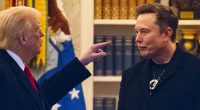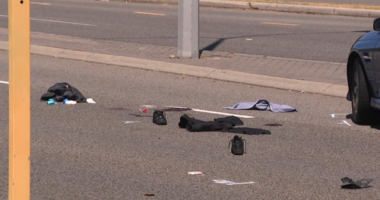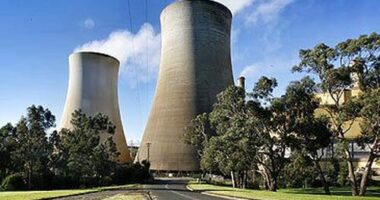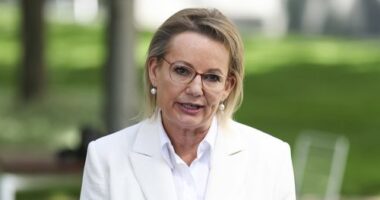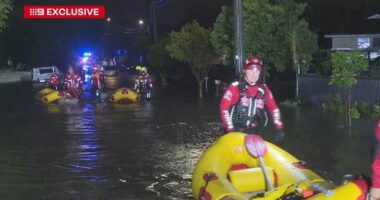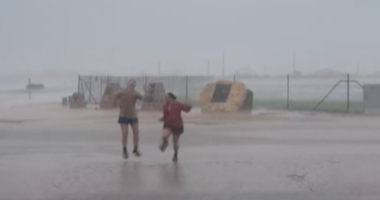Share this @internewscast.com
These concerns were highlighted after US Defense Secretary Pete Hegseth urged Australia to boost its defence spending to 3.5% of its GDP during discussions with Deputy Prime Minister Richard Marles at the Shangri-La Dialogue in Singapore last weekend.
Prime Minister Albanese expressed willingness to consider this request, noting that a similar arrangement already exists with some European nations like Germany.

The European Union raised the prospect of a security pact with Australia in May. Source: AAP / Sipa USA
Without the US alliance, Peter Dean, director of foreign policy and defence at the United States Studies Centre at The University of Sydney, says Australia would need to massively increase its defence spending or accept it can’t defend its own sovereignty.
“If you don’t have that community of nations, the example of what’s happening in Ukraine is very poignant to everybody,” he says.
[Russia maintains] a ‘might is right’ worldview, wanting to dictate the rules and order, which does not align with Australia’s interests or those of most states in our region.
Can we still rely on America?
“That is an Australian view clearly articulated in our strategy, and that is a US view, clearly articulated by the US — even under this president.”

Professor Peter Dean says there’s a common alignment between Australia and the US, particularly in the Indo-Pacific region, as well as in their overall objectives for security policies. Source: AAP / Tatan Syuflana/AP
One of the potential problems with a China-dominated region, Dean says, is its desire to “rule by law” and the way in which China would go about setting and enforcing laws.
“China particularly wants a hierarchical order where it sits on top and everyone else sits underneath,” he says.

China has one of the most powerful militaries in the world and is seeking to dominate the Indo-Pacific region. Source: SBS News
In contrast, Australia and other like-minded countries support a “rule of law” system in which a community of nations jointly sets the rules through treaties, such as the United Nations Convention on the Law of the Sea.
But Sam Roggeveen, the director of the international security program at the Lowy Institute, says the US has done very little to address China’s dramatic military modernisation since the end of the Cold War.
No matter who’s in charge in the US, I don’t think that will rescue Australia from having to think much more independently about its security.
“The harsh truth for Australia and for other allies in the region is that the Americans aren’t going to do the heavy lifting for us, and want us to do it ourselves.”
Does Australia need the US?
When it comes to international alliances, arguably the most important is NATO (North Atlantic Treaty Organization), which commits Europe and North America to protecting each other from any threat.
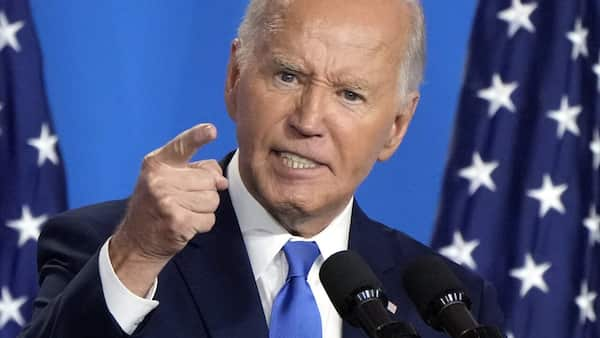
Dean says no other state can replace the size, power and influence of the US, which is the world’s number one military power.

The US has the most powerful military in the world. Source: SBS News
Dean says the US — by partnering with South Korea, Australia, Japan and other states — can aggregate enough power to balance China’s influence and there is no “ready-made state” that could easily replace it.
“With that in mind, we have to look geographically much closer to home,” he says.
Building coalitions
Defence cooperation has deepened via AJUS, while the security partnership AUKUS, which exists between Australia, the UK and the US, has laid the groundwork for Australia to acquire nuclear-powered submarines and other advanced capabilities.
“But the ultimate question is how much risk are we all going to take for each other?”

Australian Defence Minister Richard Marles (centre) with Philippine defence secretary Gilberto Teodoro Jr (left) and Australian ambassador to the Philippines Hae Kyong Yu (right) in 2023 prior to a large-scale combined amphibious assault exercise in the Philippines. Source: AAP / Philippine DND Defense Communications Service and AFP Public Affairs Office/AP
Should Australia consider a defence agreement with the European Union?
Dean agrees it’s more likely Australia and the EU would support each other diplomatically to uphold rules and standards both in Europe and the Indo-Pacific.
While Medcalf believes Australia should be helping countries like Ukraine to defend themselves, there are limitations.
What we shouldn’t be doing is ever raising the expectation that we could be a frontline military actor on the other side of the world.
But Europe is highly trade-dependent and large countries like Germany and France, in particular, have an interest in maintaining the security of shipping in the Indian Ocean and the South China Sea, he says, adding that a significant number of shipping companies are also European.

The shipping route between Europe and China through the South China Sea. Source: SBS News
Indonesia
“We have no more important relationship than Indonesia just to our north,” he told ABC’s 7.30 show.

Indonesia is predicted to be a great power by the middle of the century and it wants to be “friends to all”. Source: SBS News
Other experts are sceptical about the potential for a quasi-alliance with Indonesia.
“If you’re looking for a country that can partly fill the gap that the US may leave — I’d be looking to Japan before Indonesia. But if Indonesia ends up getting closer to our point of view, that would be wonderful,” he says.
Japan
He says both Japan and Australia share a strong belief in a rules-based system, and have different strengths they could bring to the table.
They need the resources that we have. We need their technology, we need their investment.
“But I think if the region was to have some type of strategic shock, or it was to really start to deteriorate, that would drive that alignment even closer together,” he says.

Some experts consider Japan is already in a quasi-alliance with Australia. Source: SBS News
Vietnam
However, Medcalf says the Southeast Asian country would be very reluctant to enter into a treaty-like commitment with Australia, although there is potential for more cooperation in areas such as military training.
Singapore
He says he would put Malaysia in a similar camp.

Australian and Indonesian army tanks taking part in multi-national military exercises in Indonesia in 2023. Source: AAP / Tatan Syuflana/AP
South Korea
Medcalf says South Korea also has quite deep-seated political problems domestically, and its politics can be unpredictable.
India
However, Medcalf says India is diplomatically very neutral and greatly values its autonomy.
They’re not going to be forming permanent alliance-like relationships with anyone.
“And that would be something that I think would be difficult for other countries to think about.”

India is expected to be one of the biggest military powers within the next few decades, but it values its neutrality. Source: SBS News
Philippines
Medcalf says it would make sense for Australia to have the Philippines as a partner, but caution is needed when considering the limits of its power and whether another change in government could alter dynamics.
It’s yet another example of how it’s a nice idea to try and stitch all of these relationships together into something larger but without the Americans involved somewhere along the line, it still becomes quite flimsy.

The Philippines has started modernising its military forces. Source: SBS News
Canada
“There’s something to work with there but all of this stuff is only going to work if it’s more than simply putting all your reliance on one country — they would be a small part of a much bigger puzzle.”
